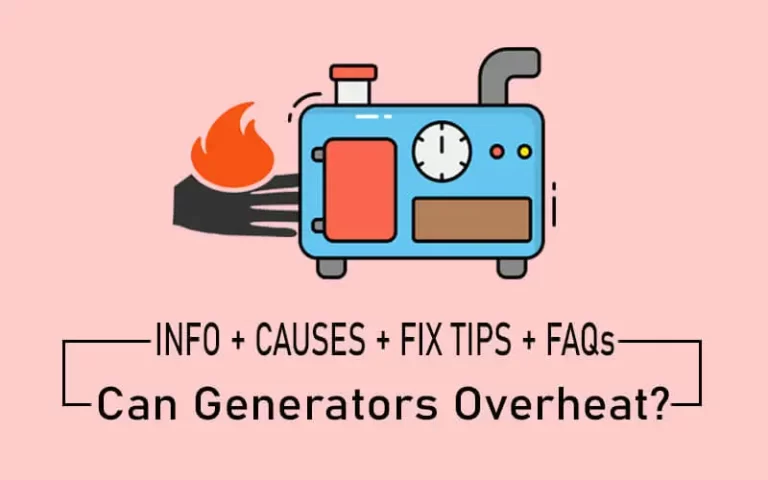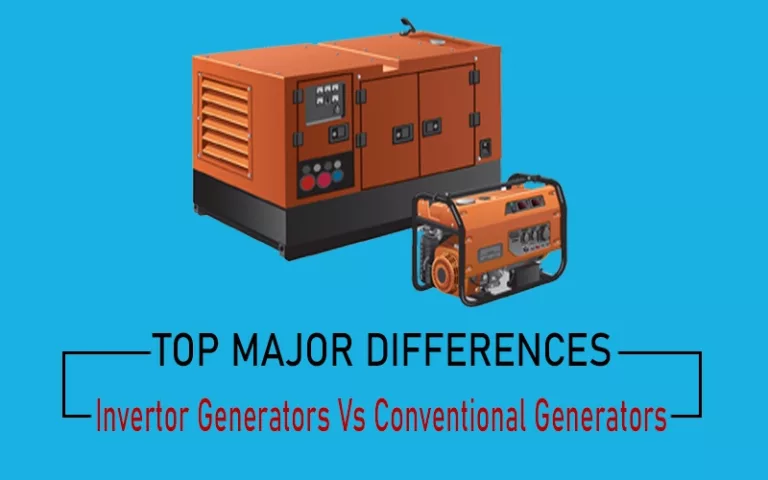Different Types of Generators (Updated Guide)
Power outages do nothing but put you in the dark of the old days when there was no concept of electricity.
Ultimately, disturb your entire life and even make you stressed badly because life does not happen in blackouts, as usual.
Even studies show if the power goes out for a longer period (during disasters or hurricanes etc.), the person could be affected psychologically; the reasons are obvious.
Hence, having generators for power backup is a must in every household.
This way, your necessary appliances keep on running, stocked meal in fridges does not get affected, and most importantly, your mind remains at peace.
But do you know what?
Most people still, after bringing a generator to their home, do not feel peace of mind but rather seem frustrated.
And this is not because of the generator but their decision to choose the wrong generator type, which does not suit them at all.
Considering this, to not make you repeat the mistake, we are crafting this guide, categorizing and explaining possible types of generators.
So that you get to know all about them and choose the one which you feel to be the right fit for you.
After choosing your generator for van life or camping or home, don’t forget to ground the generator.
Read the following guides to know more about grounding at home or during camping.
So let’s get the ball rolling;
Different Types of Generators
There are a bunch of different types of generators, and each is built to serve different purposes with their characteristics, capacities, and abilities.
- Inverter Generator
- Standby Generator
- Portable Generator
- Gasoline Generator
- Diesel Generator
- Solar Generators
- Propane Gas Generator
- Natural Gas Generators
- Hydrogen Generator
So why not categorize them all first to make you learn about them in a much simpler way?
Here we go;
- Types by their Application
- Types by their Input Energy Source
Not much to say; the categorization itself speaks out loud about the basis of their differentiation.
So let’s move on to the all types of generators that fall in them, with their explanations, to explore further;
Types of Generators by Application
1. Inverter Generators
The 3 phase of electrical production is what makes it different and better relative to many others.
The alternator attached to the engine outputs the AC power first and moves it to the rectifier for converting it into DA, and finally, the generator inverts it into AC again.
The best part about these types of generators and their production cycle is that it makes the generator operation noiseless to avoid you bothering the neighborhood during a blackout.
They are good to go, but only for the smaller spaces, cabins, and homes because of their lower power output relative to the other generators.
Though, they are meant to be 20% more fuel-efficient compared to diesel and gasoline generators.
To get more efficient results from generators, you must have basic knowledge about the working and mechanisms of how generators work.
2. Standby Generators
Standby Generators are best at starting automatically whenever the power goes out. You won’t have to make them operational manually every single time.
That’s why they are one of the most liked types of generators.
And the application of this generator makes sense for this feature, as they are supposed to be used as emergency power backups.
You will find them in critical places, such as hospitals, and be used for safety purposes of elevators, fire protection systems, and other life-related equipment.
They are the most powerful generators till now because of their ability to provide you with electricity for around 48 hours without interruption, only due to the larger tank incorporation and performance.
Eventually, all that stuff makes it less portable, heavier, and expensive.
Standby generators are only recommended for emergency and heaver uses and must not be looked at for lighter or home-based use.
3. Portable Generators
Portable generators get operated with the input of gas or diesel to provide you with a temporary power backup.
Featuring the combustion engine ensures the running of all the most necessary appliances, including the lighting, freezers, and televisions as well.
Being unable to support the higher power consumption requirements, they seem perfect only for smaller spaces and lighter use.
The best part about them is the ease of installation, which can be done by installing them along with sub-panels or by directly connecting the tools to the generator.
And another contributor to their popularity is their usefulness in remote areas.
Due to portability, they of one of the most used and famous types of generators.
Best generator brands are introducing very efficient portable generators from time to time.
Before buying a portable generator must read the buying guide about how to choose a portable generator. This guide and tips will save you money.
Types of Generators by their Input Energy Source
When it comes to the input energy source, some generators take in fossil fuel energy, while some rely on natural energy sources only.
Therefore, categorizing and differentiating generators on these bases won’t be inappropriate.
Based on the energy source, I have categorized it into two categories:
- Fossil Fuel as an energy source
- Natural Energy Source
Let’s now have a look at what are those types of generators fall under these 2 further categories;
Fossil Fuel as an Energy Source
Generators that come under the umbrella of fossil fuel are the following;
4. Gasoline Generators
Gasoline generators are the most popular generators that used to be the primary consideration whenever someone decided to have one for his home.
And the reason behind its popularity is not only the availability of gasoline all the time but the ease of use and the affordable price tag as well.
You neither have to break your bank to have one nor have to learn to use it, even if you are new to generators.
These generators also stand out in their portability and ability to be managed easily.
However, the size of the generator keeps on increasing, depending on the power outage. But for homes and cabins, it remains manageable, portable, and lighter in weight.
The only troublesome part of gasoline generators is their noise during the process.
It makes it hard for you to use it in the office or in any similar environment. Even chances of receiving complaints from the neighborhood about its noise are also there.
5. Diesel Generators
Not to emphasize, diesel generators use diesel as an input energy source, which is the least flammable fossil fuel.
Hence, the production of power backup using the combination of an electrical generator and diesel engine does not produce much heat in the process and results in efficient performance.
There are some of their upgraded models can be operated using other natural energy sources.
But for experiencing the best performance of them, only diesel would be the right choice.
The best part is that it also comes at an affordable price, and diesel is another readily available fossil fuel.
Therefore, it proved to be the right alternative to a gasoline generator.
When choosing between them, remember that diesel generators are more durable, feature sturdy construction, have low maintenance costs, and have a longer lifespan.
They are one of the most durable types of generators.
The only drawback is the incompatibility of its operation in the wet environment, as there are chances of destroying an engine due to its moisture.
Natural Energy Source
Here come the types of generators which use natural energy sources as input.
6. Solar Generators
Solar generators use a natural source, the sun’s radiation, to make you deal with the power shortage at your home.
They initially work to collect the sun’s radiation to ultimately charge the attached batteries, which were later used to produce electricity.
And the produced power does not get directly to the appliances.
Still, it is supposed to be inverted to alternating current using the attached inverter to keep your appliances running with their required current type.
You might have got an idea that the entire mechanism is based on 3 components, including; an inverter, batteries, and charge controller.
There is no need or expense for fuel, and the process does not emit harmful emissions.
This way, you save a lot on fuel expenses.
But unfortunately, they are not easy to set up. You need to spend a hefty amount in start to make it run, and even have higher maintenance costs relatively.
They are recommended only if you can afford to experience their luxury or want to have something that does not affect the environment.
7. Propane Gas Generators
Propane gas is another natural gas that will always be available on the market.
Therefore, with propane gas generators, you will never have difficulty dealing with power outages.
Not only that but propane can also be stored in quantity, which becomes useful in emergencies.
They are found to be better than both gasoline and diesel generators because of their longer life, cleaner burn, and the fact that, unlike diesel generators, they can be used even in wet conditions.
All that stuff, along with its noiseless operation and effective performance, makes it the best option. But there is a flip side to the story as well.
They can’t be bought by everyone, because of being expensive. And even if bought, you need to use them consciously with the proper care, as propane is a highly flammable energy source.
8. Natural Gas Generators
Natural gas generators must not be new to you, as they are the most commonly used generators.
And the reason is obvious, their input energy source (liquefied petroleum gas) is easily accessible by everyone and does not get short.
It would not be wrong to claim their input energy source has a limitless supply everywhere.
Not only this, but they are fairly easy to use, burn cleaners, are fuel-efficient, have a noiseless operation, and, more importantly, do not cost you a fortune.
The only drawback associated with these generators is the one-time, yet higher installation cost, and they do not even last much longer relative to the diesel generator.
9. Hydrogen Generators
Generators using hydrogen as an input energy source are not commonly used because their energy source can’t be accessed by everyone easily.
Whereas they come with a bunch of advantages, such as the capacity to produce more power relative to any other type of generator.
They are more similar to the solar generator, but the best part is that you won’t have to rely on weather conditions for power backup.
Whenever needed to produce energy, fill it up with the energy source and let the generator perform its work.
Considering both sides of the generator, we recommend it be used only in laboratories or any controlled environment.
Though, for the portability and durability, you can get it for larger homes, only if it can be used properly with conscious care.
But before making any decision, remember that they can’t perform well in cold weather.
FAQs: Types of Generators
What are the types of generators?
- Inverter Generator
- Standby Generator
- Portable Generator
- Gasoline Generator
- Diesel Generator
- Solar Generators
- Propane Gas Generator
- Natural Gas Generators
- Hydrogen Generator
What are the four types of electrical generators by application?
- Portable generators
- Standby generators
- Industrial generators
- Inverter generators
What are the types of generators by their input energy source?
- Gasoline Generators
- Diesel Generators
- Solar Generators
- Propane Gas Generators
- Natural Gas Generators
- Hydrogen Generators
What types of generators are available?
The most common generators are gasoline, diesel, and natural gas.
Gasoline generators are typically the most portable and least expensive option, but they require regular maintenance and may not be as fuel-efficient as other generators.
The high power, output, and reliability of diesel generators make them ideal for industrial applications, but they can be more expensive to operate than other types.
Natural gas generators are a popular choice for long-term backup power, as they are typically more fuel-efficient and emit fewer pollutants than other generators.
Final Verdict
All the generators may seem the same to an average user, but they all differentiate on a certain basis.
And we have categorized them accordingly while explaining all types of generators for their respective category.
Don’t fall for any type of generator.
Check out their individual capacities and characteristics from our listed types of generators to grab the one that corresponds with your scenario.
Otherwise, you will have nothing but to regret at the end of the day.





![What will a 10000-watt Generator Run [Watts Breakdown +FAQ]](https://allgeneratorinfo.com/wp-content/uploads/2022/01/what-will-a-10000-watt-generator-run-768x480.webp)

